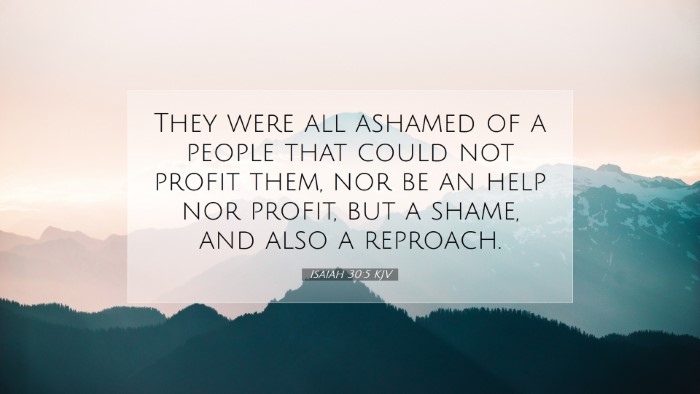Commentary on Isaiah 30:5
Text of Isaiah 30:5: "They were all ashamed of a people that could not profit them, nor be a help nor profit, but a shame, and also a reproach."
Introduction
The verse encapsulates God's message to His people regarding their reliance on Egypt and other nations for political and military support. It reflects the futility of seeking assistance from sources that cannot provide true help or benefit. In examining this verse, we draw insights from prominent public domain commentaries to explore its meaning and implications for faith and dependence on God.
The Context of Isaiah 30
Isaiah 30 marks a critical point during a time of impending judgment on Judah. The people of Judah were inclined to seek aid from Egypt rather than looking to God for deliverance. This unwillingness to trust in divine providence ultimately serves as a warning against misplaced trust in worldly powers.
Insights from Matthew Henry
Matthew Henry emphasizes the absurdity of trusting in Egypt and describes the people as being "ashamed" of their alliances. He points out that they are like "a man who seeks help from a friend and finds him to be a deceiver." Henry encourages readers to examine their own lives and recognize any instances where they may be relying on secular systems rather than divine authority.
Insights from Albert Barnes
Albert Barnes expands on the implications of relying on nations that are themselves impotent to deliver or assist. He notes that this shame is twofold: first, because the nations in which they placed their trust were powerless, and second, because such actions expose the weakness of their faith in God. Barnes remarks that true security can only be found in reliance on the Lord, who is characterized as a "very present help in trouble." The wasted efforts of seeking help from Egypt highlight the futility of relying on flesh instead of the Almighty.
Insights from Adam Clarke
Adam Clarke offers a historical perspective, pointing out the dynamics of Judah’s relationship with Egypt and the reasons for such alliances. He describes the chapter as a testament to the faithlessness of God’s people, wherein they sought salvation through political means rather than divine intervention. Clarke emphasizes that the outcome is predictably disastrous as Egypt becomes a source of reproach rather than refuge. He echoes the sentiment that any gains made through such national alliances are ultimately hollow and lead to shame.
Theological Reflections
This verse invites theological reflection on the nature of divine providence and human agency. It raises essential questions about faith and reliance on God versus human wisdom. The case of Judah serves as a reminder that when people forsake their relationship with God for temporary alliances, they can expect disappointment and spiritual shame.
The Danger of Misplaced Trust
- Illusions of Security: Many today, much like the people of Judah, fall prey to the illusions of security that come from political, economic, or social alliances rather than a deep-seated trust in God.
- Repentance and Restoration: The passage beckons believers to reflect on their reliance on God as a source of true help, prompting a return to faithfulness in their walk with the Lord.
- The Consequences of Rejection: The shame and reproach associated with seeking help from a powerless entity underline the consequences of rejecting God’s ways.
Conclusion
Isaiah 30:5 serves to challenge both individuals and communities to consider where their trust lies. It powerfully illustrates the necessity of faith in God over reliance on human strategies. As pastors, students, theologians, and scholars delve deeper into God’s Word, may they find strength and insight from Isaiah’s admonition to turn away from sources that lead to reproach and instead lean into the everlasting arms of the Almighty.
Further Applications
- Examine Relationships: Encourage congregations to evaluate their relationships and alliances to ensure they align with biblical truths.
- Preach about True Dependence: Use this verse to teach about the importance of true dependence on God, especially in times of crisis.
- Foster a Culture of Prayer: Lead communities to cultivate a culture of prayer that seeks God’s wisdom and intervention instead of worldly solutions.


